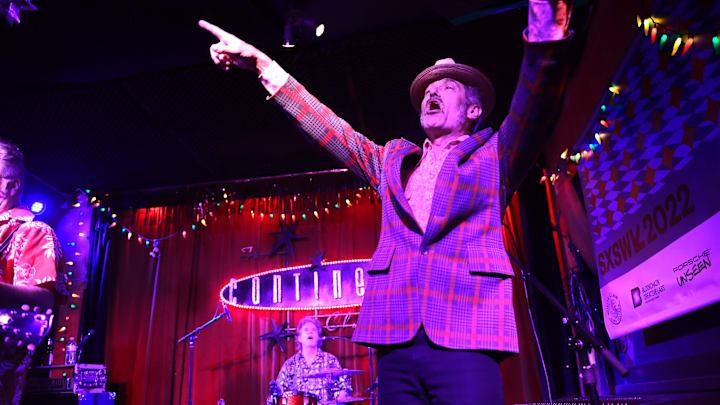“We went to a shopping mall and laughed at all the shoppers – Security guards trailed us to a record store – We asked for Mojo Nixon – They said 'He don’t work here.' – We said 'If you don’t got Mojo Nixon then your store could use some fixin’.”
That was the Dead Milkmen from their 1988 song “Punk Rock Girl,” and sad to say, Neill Kirby McMillan, Jr, known to the world as Mojo Nixon, no longer works here. He passed away Wednesday onboard the Outlaw Music Cruise, a production of the Sirius XM Outlaw Music station where he hosted a popular afternoon program. He had performed one day before succumbing to what is being labeled as a “cardiac event.” He was 66 years old.
I’d like to believe that his audience for that final show included the likes of Martha Quinn and Judge Judy, Debbie Gibson and Michael J. Fox, Shane McGowan and his dentist. I’d like to believe Howlin’ Wolf rose up from the dead to perform Mojo’s own unique take on “Will the Circle Be Unbroken,” and that the entire event was emceed by Elvis himself.
Mojo Nixon was different things to different people
All of them, along with dozens of others, were subjects of Mojo’s rockabilly – a few were heroes, though most were villains. Not many had the grace and humor of Don Henley, who famously stormed the stage at a Nixon show so that he could join in singing one of Mojo’s hits, “Don Henley Must Die.”
Hard to imagine Morrissey (AKA “that fruitcake that sings in The Smiths”) joining him for a duet on “Girlfriend in a Coma.”
Mojo was a crude social satirist in a rock & roller’s body. He aimed slightly higher than Bloodhound Gang, though he often managed to sink even lower. It’s not just that Mojo sang songs about masturbation. Mojo sang songs about your grandmother masturbating - with an ear of corn, no less. As a social liberal, he often took shots at conservative politicians and opinion-makers, but he had little trouble turning the lens on himself as in 1994’s “Love Me, I’m a Liberal.”
“Once I was young and had an attitude – Stickers covered the car I drove in – Even went on some direct actions – When there weren’t rent-a-cops to be seen – Ah, but now I’ve grown older and wiser – And that’s why I’m turning you in.” You can listen to this four-minute song and skip reading Thomas Frank’s “Listen Liberal.” You’re welcome.
Above all, Mojo was self-aware. He could not sing. He could not play guitar. He wasn’t an especially gifted songwriter. Yet he forged a career as a rock & roll performer because of the strengths he did possess. He had a curious mind. He was fearless, and he was funny. He once told Wil Forbis on his Acid Logic program,
“With what I do, people come to see the monkey show, meaning the crazy stuff I say in between songs and whatnot. Obviously, I use very familiar musical themes in the songs because I’m no real musician. I see real musicians and I hate ‘em. They can play any key, any song, they can do anything. I can’t do any of that.”
What Mojo could do was turn his steady, unblinking gaze on American culture and deliver epic takedowns. He could take a gospel standard like “Will the Circle Be Unbroken” and come up with “Will the Fetus Be Aborted.” Along with fellow traveler Jello Biafra, he could rework the novelty hit “Plastic Jesus” into,
“If I weave around at night – and the police think I’m tight – They’ll never find my bottle though they ask (yes they ask) – Plastic Jesus shelters me – For his head comes off, you see – He’s hollow and I use him for a flask.”
Yes, there weren’t many cows – sacred or secular – that Mojo wouldn’t go off on. Maybe the most inspirational thing we can take from his life is the fact that he did all this, and though he took lots of brickbats, he was able to build a very good career out of it. So good in fact, that you could hear his familiar “Outlaaaaaaaaaaaaw Country” howl every weekday on your Sirius XM dial. So good that he was able to sing and drink and generally carouse with his friends and fans on a luxury cruise, and get paid for it.
That’s what I’ll try to take away from Mojo’s example. Say what you want. Try to say it with some wit. And if you choose to bludgeon others, you’d better be prepared to subject yourself to the same level of scrutiny.
Mojo’s most famous song – the song that put him on the map and often kept him there – was “Elvis is Everywhere.” Well, no one would argue that Mojo Nixon is everywhere, least of all Mojo himself. But, as the Dead Milkmen knew, if you don’t have at least a trace of Mojo in your world, then your world could use some fixin'.
